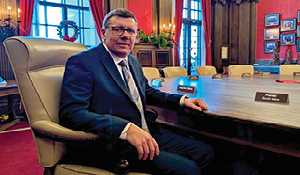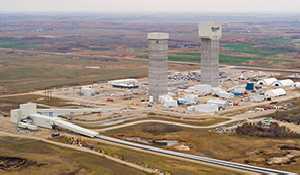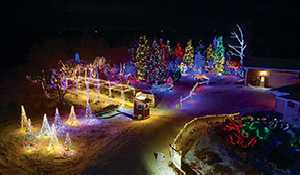Nepali journalist has had a life of adventure
From success as a journalist to reaching the peak of Mount Everest
June 10, 2024, 9:47 am
Ashley Bochek


Doma Sherpa has led a life full of adventure. Growing up in a small community in the mountains of Nepal, she had to overcome the objections of some to become a journalist, and also overcame all of the challenges on a three-month ascent to the summit of Mount Everest.
Sherpa was in the area last week visiting her friend Barb Widger of Virden, who met her on a trip to Nepal several years ago.
She visited the World-Spectator on Tuesday explaining her journalism career and climbing Mount Everest.
The interview follows:
Tell us a little bit about your life growing up in Nepal.
I grew up in Nepal near Mount Everest. My childhood was a little bit hard and a little bit good.
What is it like being a journalist in Nepal?
Journalism in Nepal is challenging for us because I belong to the Indigenous community of the Sherpa and our women arenít usually allowed to work in the journalism sector because of our culture. Children normally go to school only up to the tenth grade. Culturally, they say once youíre done 10th grade then you can go to work. Thatís the tradition. They donít focus on the media sector. They are saying ĎOh this is not good for a woman.í And journalism is a very challenging job in Nepal. In our communities there are still few women and men working in the journalism sector because of the language problem. We speak our ethnic language, Sherpa, and our national language is Nepali, so when we speak in the Nepali language some people say it is not clear. If our information is clear and our voice is clear then there is no problem now.
When I started university to study media, I took a class to improve my Nepali language to be a better journalist. After that, I worked for my internship on the radio, then once I was done my internship I wasnít hired, because my Nepali language was not clear, so I was not selected. After that I improved and started to work in online media as a reporter. Then I did a talk show on the radio, and then National television also.
Is there freedom of expression in Nepal?
Yes, we wrote everythingóespecially in areas like tourism in Indigenous communities. We frequently wrote about everything. That is no problem in Nepal.
How did you get into journalism?
When I was a child every time the news came on the radio in Nepal, we listened to everything, whether it was 7 am or the 7 pm news. It is so important. Everyone listened to the radio in Nepal at that time. I talked to my parents and told them I wanted to join the media, but everyone was like ĎDoma is going to be a journalist for a profession!í just because it wasnít traditional.
The area where I grew up was isolated. It would take four days to walk to the city from my family farm. Three years ago people didnít want to allow for the road, they didnít want to pay for the land, but my father bought us some land and said ĎA road is important,í then we got this agriculture road. It makes it much easier. We grow kiwi, ginseng, Nepali herbs, and apples, just about everything.
What is your proudest moment as a journalist?
My big achievement is studying to be a journalist and then after that my summit to Mount Everest. That is my big achievement. Another is working with women. I am involved in different organizations which are voluntary. I started working for this Indigenous youth organization. In 2019, I was one of 50 women from Nepal selected to be featured in a book because of their contributions, and making a difference. I am grateful.
How did you decide you wanted to climb Mount Everest?
In 2014, I was working with a social organization for our community, a media group. We encourage the youth who are interested in the media. I was working for this organization, also for Gurkha FM. I would do a lot of interviews. There were a lot of climbing Sherpas who died and their bodies were taken to Kathmandu. I saw everything. Wives and Moms, Dads, children, everyone was crying. I was thinking, Iím a journalist and Iím in the Sherpa community also. So I planned to go to Mount Everest because Iím a journalist and I can go there and see what is all going on there and so after that I decided I was going.
How did you train for it?
In 2014 and 2015, I was planning the climb. Mentally I prepared myself. Then, I talked to my family. I talked to the tourism minister also saying I could do it because Mount Everest is a tourist attraction in our country. Nepal tourism department, they belong to the Mountaineering sector and I talked a lot to them.
I prepared for myself. In Kathmandu there is a lot of rock wall climbing. Every week I was going to climb, to prepare for Mount Everest. In December 2017, I summitted Island Peak and I realized then I was prepared for Mount Everest. In 2018, I summitted to Mount Everest. My first attempt wasnít successful. After that, I came back to base camp and then I went a second time all the way up.
What is it like climbing Mount Everest and how difficult was it?
It was very difficult. When we went to Mount Everest we didnít know if we would come back or not. It was like 50/50. Life is not sure at Everest. Every day we would listen to the avalanches.
Widger adds: Itís like listening to thunder except it is the ice falling and you know the next morning you are going to walk through that.
Sherpa continues: We went to base camp, to Camp One to get acclimatized for the climb and then when we came back there was an avalanche and the path was closed. Ice protection came and they fixed it, then we could keep going.
How long did it take to reach the top?
It was three months from Kathmandu to the summit, and then to come back to Kathmandu is about three months.
How did it feel being at the top of Mount Everest?
I thought I was in the heavens. Nothing feels like it. I am so lucky because when I reached the top there was no wind. It was clear and you could see everything. From the top you could see China. It was amazing. I canít explain the feeling. There are mountains all around. Everest is the top and all mountains below, are on every side, everywhere.
How long did you stay at the summit?
I was there from 5-5:30, I stayed at the top. I am enjoying it all. This is my lifeís big achievement. Coming down is the hardest part when climbing Mount Everest. We used up all our energy going up, so coming down takes a long time and youíve used up all your energy. Everyone just wants to get down.
Why are you here in Saskatchewan and Manitoba today?
Today I am here visiting my friend Barb. I live in Toronto now but we met in 2019, about five years back. I want to see the flatland. Winnipeg to here it was a straight flat road. This is my first time out in Saskatchewan. We are going to go see the Grasslands National Park.
Now that she lives in Canada, Sherpa is hoping to become a lawyer.



































